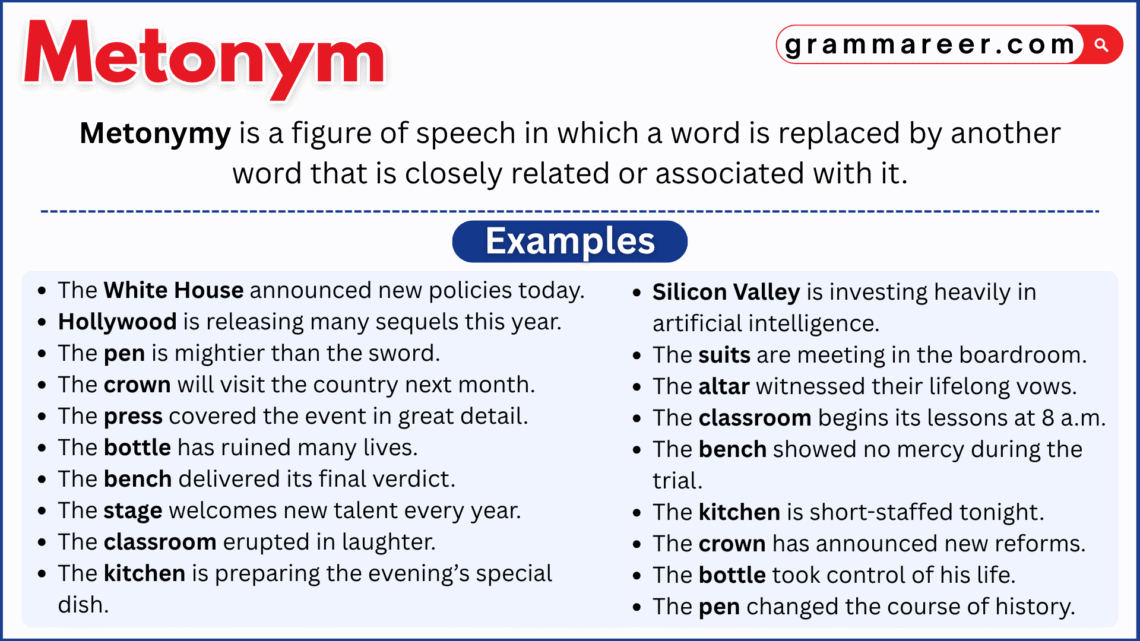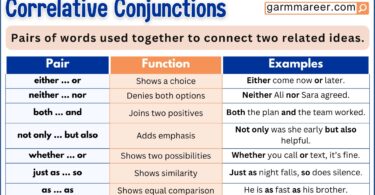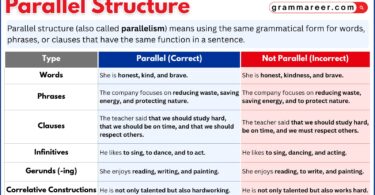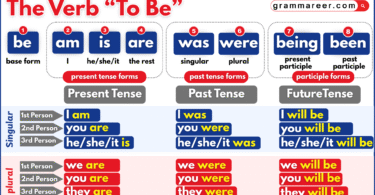Have you ever heard someone say “Hollywood is making great movies” or “The White House announced new policies”? In these sentences, words like Hollywood and The White House don’t mean the actual places, they stand for something related to them. That’s what we call a metonym. It’s a way of using one word to represent another idea that’s closely connected to it.
In this article, we’ll learn what a metonym is, how it’s used, and see some common examples from everyday English.
Table of Contents
Metonymy Definition
Metonymy is a way of using one word to talk about something that’s closely related to it. Instead of saying the exact name, we use another word that has a strong connection to it. We often do this in daily life without realizing it.
For example:
- Wall Street is nervous today.
Here, Wall Street doesn’t mean the street itself. It stands for the people and businesses in the financial world.
Metonymy makes our sentences sound more natural and interesting. You’ll often hear it in news, movies, and everyday speech.
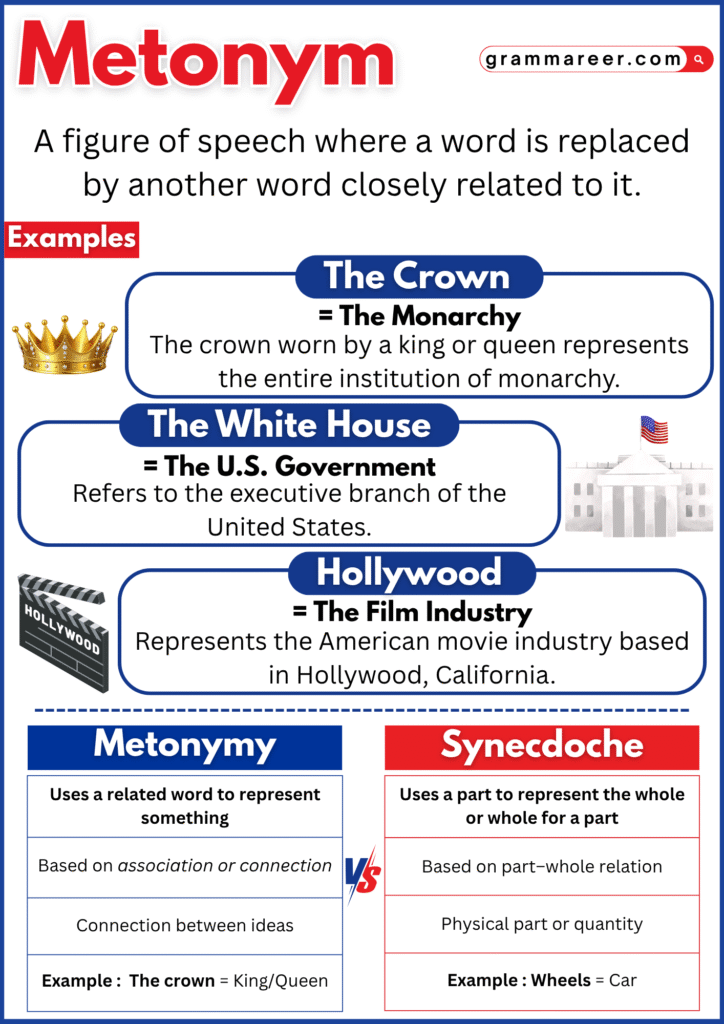
When to Use a Metonym
A metonym is a word we use to represent something that’s closely connected to it. It’s a simple way to make our language sound more natural and expressive. For example, when we say “The White House announced new plans,” we don’t mean the building spoke — we mean the people working there.
We use metonyms all the time, often without realizing it. They help us sound smoother and avoid repeating the same words. For instance, saying “Hollywood is making more action films” sounds more natural than saying “The American film industry is making more action films.”
Metonymy Pronunciation:
You pronounce metonymy like this: meh-TAH-nuh-mee
Metonymy vs. Synecdoche
Metonymy and synecdoche sound a bit tricky, but they’re actually easy to understand once you know the difference. Both are figures of speech that replace one word with another — but they don’t work in the same way.
| Metonymy | Synecdoche |
| Metonymy is when we use a word that’s closely connected to something else. | Synecdoche, on the other hand, is when we use a part to talk about the whole, or a whole to talk about a part. |
| Examples: The stage cheered loudly. Here, the stage doesn’t mean the wooden platform — it stands for the performers. | Examples: The sailor spotted land on the horizon. If we say “All hands on deck,” the word hands refers to sailors — a part representing the whole person. |
| Metonymy swaps a word for something related to it. | Synecdoche swaps a word for a part or whole of it. |
Metonymy vs. Metaphor
| Metonymy | Metaphor |
| In Metonymy replaces one word with another that’s closely related. It’s like using a shortcut because the two things are naturally connected. | In Metaphor, on the other hand, compares two things that aren’t literally connected. It’s more imaginative and often paints a vivid picture. |
| Example: She has a good head for numbers. Here, head represents intelligence or thinking ability. The connection is direct — the head is naturally linked to the mind. | Example: Life is a journey. Life isn’t literally a road or path, but the metaphor helps us understand it as something with twists, turns, and challenges. |
Metonymy vs. Metalepsis
Now let’s understand the difference between metonymy and metalepsis.
| Metonymy | Metalepsis |
| Metonymy is when a word stands for something it’s closely connected to. | Metalepsis is a step further. It uses a word indirectly, often through a chain of associations, so you have to think a little to understand the meaning. |
| Example: The kitchen is preparing dinner. Here, kitchen doesn’t literally cook — it represents the chefs or cooks working there. The connection is direct and easy to understand. | Example: She’s carrying the weight of the world on her shoulders. First, weight suggests responsibility. Then, weight of the world exaggerates it to mean enormous pressure or stress. |
You can think of metalepsis as a “metonymy of a metonymy” — it relies on one association, then builds another on top of it.
Metonymy Examples
We use metonymy so often that we don’t even notice it. It appears in daily talk, news headlines, songs, and stories. Below are some simple and common examples that show how metonymy works in real life.
| Metonym | Meaning | Example Sentence |
| The White House | The U.S. President or government | The White House released a statement this morning. |
| Hollywood | The American film industry | Hollywood loves superhero movies these days. |
| The classroom | The students | The classroom burst into laughter after the joke. |
| The kitchen | The cooks or staff | The kitchen is busy preparing tonight’s dinner. |
| The pen | Writing or communication | The pen has the power to change minds. |
| The stage | Performers or theater world | The stage came alive with music and lights. |
| The bottle | Alcohol or drinking | He gave up the bottle years ago. |
| The crown | The king or queen | The crown approved the new policy. |
| The bench | Judges or the court | The bench delivered its final verdict. |
| The city | The local government | The city plans to build more public parks this year. |
Why Metonyms Matter
Metonyms are a useful that make your writing and speech more engaging and lively. They let us express our ideas in a short, clear way without repeating the same words over and over.
- Example: Hollywood is releasing a new blockbuster this summer.
Here, Hollywood doesn’t mean the place itself — it stands for the movie industry. Using this metonym makes the sentence smoother and easier to read.
Use metonyms in stories, news, or casual writing to make your language more natural and lively.
You May Also Like

